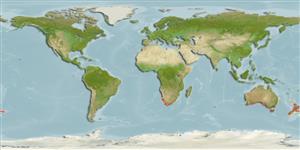Common names from other countries
>
Eupercaria/misc (Various families in series Eupercaria) >
Emmelichthyidae (Rovers)
Etymology: Plagiogeneion: Greek, plagios = oblique + Greek, geny, genyos, diminutive = face (Ref. 45335).
Environment: milieu / climate zone / depth range / distribution range
Ecologia
marinhas batidemersal; intervalo de profundidade 30 - 600 m (Ref. 106682). Deep-water; 22°S - 40°S, 14°E - 170°E
Southeast Atlantic: Vema Seamount west of Cape Town and off Algoa Bay, and Walvis Bay in Namibia. Southern Indo-West Pacific: St. Paul and Amsterdam Islands, southern Australia, and New Zealand.
Tamanho / Peso / Idade
Maturity: Lm ? range ? - ? cm
Max length : 60.0 cm TL macho/indeterminado; (Ref. 5325); common length : 40.0 cm TL macho/indeterminado; (Ref. 115123); Idade máx. registada: 10 anos (Ref. 35378)
Descrição breve
Chaves de identificação | Morfologia | Morfometria
Espinhos dorsais (total) : 12; Raios dorsais moles (total) : 10 - 12; Espinhos anais: 3; Raios anais moles: 10. Rosy pink in color, brownish dorsally, silvery below; fins red, tips of caudal fin blackish (Ref. 5325).
Adults occur near sandy or muddy bottom in deep water. Feeds on larger zooplankton (Ref. 3394). Marketed fresh or frozen and proves to be an excellent foodfish (Ref. 115123).
Life cycle and mating behavior
Maturities | Reprodução | Spawnings | Egg(s) | Fecundities | Larvas
Heemstra, P.C., 2016. Emmelichthyidae. pp. 2526-2533. In K.E. Carpenter and N. De Angelis (eds.). The living marine resources of the Eastern Central Atlantic. Vol. 4: Bony fishes part 2 (Perciformes to Tetradontiformes) and sea turtles. FAO Species Identification Guide for Fishery Purposes, Rome, FAO. pp. 2343-3124. (Ref. 115123)
Categoria na Lista Vermelha da IUCN (Ref. 130435)
CITES (Ref. 128078)
Not Evaluated
Ameaça para o homem
Harmless
Utilização humana
Pescarias: espécies comerciais
Ferramentas
Relatórios especiais
Descarregue XML
Fontes da internet
Estimates based on models
Preferred temperature (Ref.
115969): 9 - 19.7, mean 14.2 (based on 63 cells).
Phylogenetic diversity index (Ref.
82804): PD
50 = 0.5313 [Uniqueness, from 0.5 = low to 2.0 = high].
Bayesian length-weight: a=0.01047 (0.00491 - 0.02235), b=3.07 (2.87 - 3.27), in cm Total Length, based on LWR estimates for this species & (Sub)family-body (Ref.
93245).
Nível Trófico (Ref.
69278): 3.4 ±0.45 se; based on food items.
Resiliência (Ref.
120179): Médio, tempo mínimo de duplicação da população 1,4 - 4,4 anos (tmax=10; K=0.33; tm=3-4).
Fishing Vulnerability (Ref.
59153): Moderate vulnerability (41 of 100).
